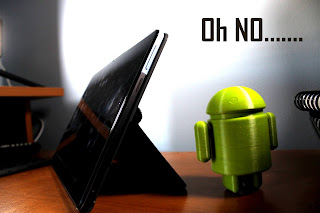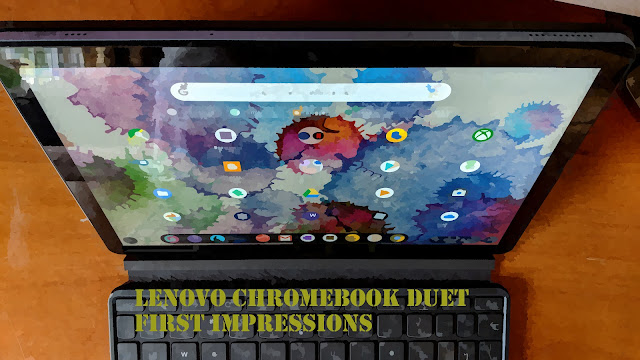Featured
- Get link
- X
- Other Apps
What Chrome OS needs to match the iPad
With the breaking news of M1 Macs and new iPad I've begun to think about the other OSes out there. I started looking at Windows, Linux, Android, and Chrome OS. What I saw was the potential of one and only one OS: Chrome OS. Chrome OS has made the journey from that freak OS that only ran the Chrome browser to the Android-running, Web-App relying, Linux containerizing, OS that it is today. I've seen the surge of iPads being used for more than Netflix, their being used as Laptop replacements, or Laptop companion, but the no matter what the iPad's prime directive is to be the best tablet. Same with Windows and Linux, Windows to the best OS for enterprise/productivity and Linux to be the collective of OSes for the open-source and privacy community.
Chrome OS is one of the only Multipurpose OS that can go beyond the desktop into the mobile space, specifically tablets. Obviously, we've seen the failure of Android tablets and the resurgence of Windows Tablets but neither offer the promise that Chrome OS offers. I've done extensive content on the Lenovo Chromebook Duet and how it's influenced the Chrome OS ecosystem and the Tablet Market in general and for the right people it's a real contender to the iPad but it's still an acquired taste for most people. So how can Chrome OS fix the woes it currently has with tablets? That's what I'll be talking about in this article, how Chrome OS can improve on its current tablet mode and what it needs to match the iPad and someday, even beat it.
So, what does Chrome OS need to work on? It comes down to interface, Apps, and experience.
The tablet interface was updated in Chrome OS 81 with new gestures that upgraded Chrome OS from a non-starter to a no-brainer. Although great they still need some work on the interface, particularly the home screen, I think it's outrageous that despite having Android integrated into Chrome OS you can't use the best parts of Android in Chrome OS. For example, custom launchers are a necessity for me, I did an article a couple of months ago about how using a custom launcher revitalized my Android Tablet. Custom Launchers won't work on Chrome OS and I'm not willing to take the risk myself. Another thing to do is to improve the native launcher, honestly, it's just a boring, classic in the worst way, grid of apps.
Now I know that Chrome is Changing shells every time it switches to tablet mode, but it still needs more...more style at the very least. Maybe a Google feed when you swipe left or the ability to put widgets from Android apps, or even a normal Android home screen with and App drawer at the disposal of a right swipe (like Windows Phone).
The gestures and notification UI are golden and really doesn't need changing, only slight modifications to the fluidity to make the gestures smoother. One last thing to fix is multitasking, now I usually don't multitask, but we need to fix it, there are often glitches when split screening Web Apps and Android Apps. The Glitch being anytime I swipe up on any of the Apps the app switcher menu comes up, this is very isolated and not constant but the very fact it happened is still appalling. I would enjoy being able to have a third App in split screen and better picture-in picture support.
Chrome OS is lightweight enough to be a practical tablet OS and the Duet is living proof of concept. Honestly, it's not surprising to see Chrome OS needs some work on tablets. As said earlier the iPad was born with the sole idea of being the best tablet OS, as time went by the iPad had to work to become the hybrid OS it is today that's full tablet but still quasi-laptop with mouse support but lacks the nuanced features needed to do other laptop tasks such as universal printing. Chrome OS is coming from the other side of that spectrum; its biggest strength is that it was born to be a desktop OS and it is making its way to mobile. Unlike iPad OS, Chrome OS is coming from the opposite side of the spectrum making getting tablet mode locked down much harder. Chrome OS is so light and flexible I have confidence it can revamp the interface to become a better tablet experience than it is now, but for now it'll suffice.
Now let's talk apps, there are 2 workable apps to use when on tablets, web apps and Android apps. Now most Web apps are responsive meaning that most are already optimized for tablets, they also work great with multi-tasking. Android apps are more of a wildcard, the reason Android tablets died was a chicken-egg problem. No one bought Android tablets because the apps weren't great, no one optimized or improved their Android apps because no one was buying Android tablets, this endless cycle just destroyed Android tablets. However, developers now have opportunities to change, unlike Android tablets Chromebooks are an established market. Devs have an established market to make their Android apps wok better for Chrome OS, most work fine, kindle and Netflix/Disney+ are splendid examples of great apps working on Chrome OS.
Lastly, we have the overall experience, does the Chrome OS experience work for tablets? I think Chrome is a fitting example of this, Chrome itself has been optimized for tablets with an excellent interface and experience. An iPad is an experience in integration that just...works. The Chrome OS experience is still for the brave and loyal, the people like me who will never surrender to the iPad and if Google can fix Chrome OS I won't have to.
Best, BenTechCoder
- Get link
- X
- Other Apps
Popular Posts
Lenovo Chromebook Duet review: Opportunity knocks
- Get link
- X
- Other Apps



Comments
Post a Comment
If have something to say go ahead and speak your mind but please do so with respect for others opinions.